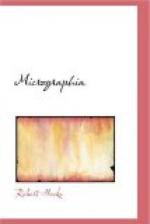Air; then inverting it as before, I fill it top full
with clear and well strain’d Quicksilver,
and having made ready a small ball of pretty hard
Cement, by heat made very soft, I press it into the
hole E, and thereby stop it very fast; and to
secure this Cement from flying out afterward,
I bind over it a piece of Leather, that is spread over
in the inside with Cement, and wound about it while
the Cement is hot: Having thus softned it,
I gently erect again the Glass after this manner:
I first let the Frame down edge-wayes, till the edge
RV touch the Floor, or ly horizontal; and then
in that edging posture raise the end RS; this
I do, that if there chance to be any Air hidden in
the small Pipe E, it may ascend into the Pipe
F, and not into the Pipe DC: Having thus
erected it, and hung it by the hole Q, or fixt it
perpendicularly by any other means, I open the
end F, and by a small Syphon I draw out
the Mercury so long, till I find the surface
of it AB in the head to touch exactly the line
XY; at which time I immediately take away the
Syphon, and if by chance it be run somewhat
below the line XY, by pouring in gently a little
Mercury at F, I raise it again to its desired
height, by this contrivance I make all the sensible
rising and falling of the Mercury to be visible
in the surface of the Mercury in the Pipe
F, and scarce any in the head AB. But because
there really is some small change of the upper surface
also, I find by several Observations how much it
rises in the Ball, and falls in the Pipe F, to
make the distance between the two surfaces an inch
greater then it was before; and the measure that it
falls in the Pipe is the length of the inch by
which I am to mark the parts of the Tube F, or
the Board on which it lyes, into inches and Decimals:
Having thus justned and divided it, I have a large
Wheel MNOP, whose outmost limb is divided into
two hundred equal parts; this by certain small Pillars
is fixt on the Frame RT, in the manner exprest in the
Figure. In the middle of this, on the back
side, in a convenient frame, is placed a small
Cylinder, whose circumference is equal to twice the
length of one of those divisions, which I find
answer to an inch of ascent, or descent, of Mercury:
This Cylinder I, is movable on a very small Needle,
on the end of which is fixt a very light Index KL,
all which are so pois’d on the Axis, or
Needle, that no part is heavier then another:
Then about this Cylinder is wound a small Clew of Silk,
with two small steel Bullets at each end of it
GH; one of these, which is somewhat the heavier,
ought to be so big, as freely to move to and fro
in the Pipe F; by means of which contrivance, every
the least variation of the height of the Mercury
will be made exceeding visible by the motion to
and fro of the small Index KL.
But this is but one way of discovering the effluvia of the Earth mixt with the Air; there may be, perhaps many others, witness the Hygroscope, an Instrument




